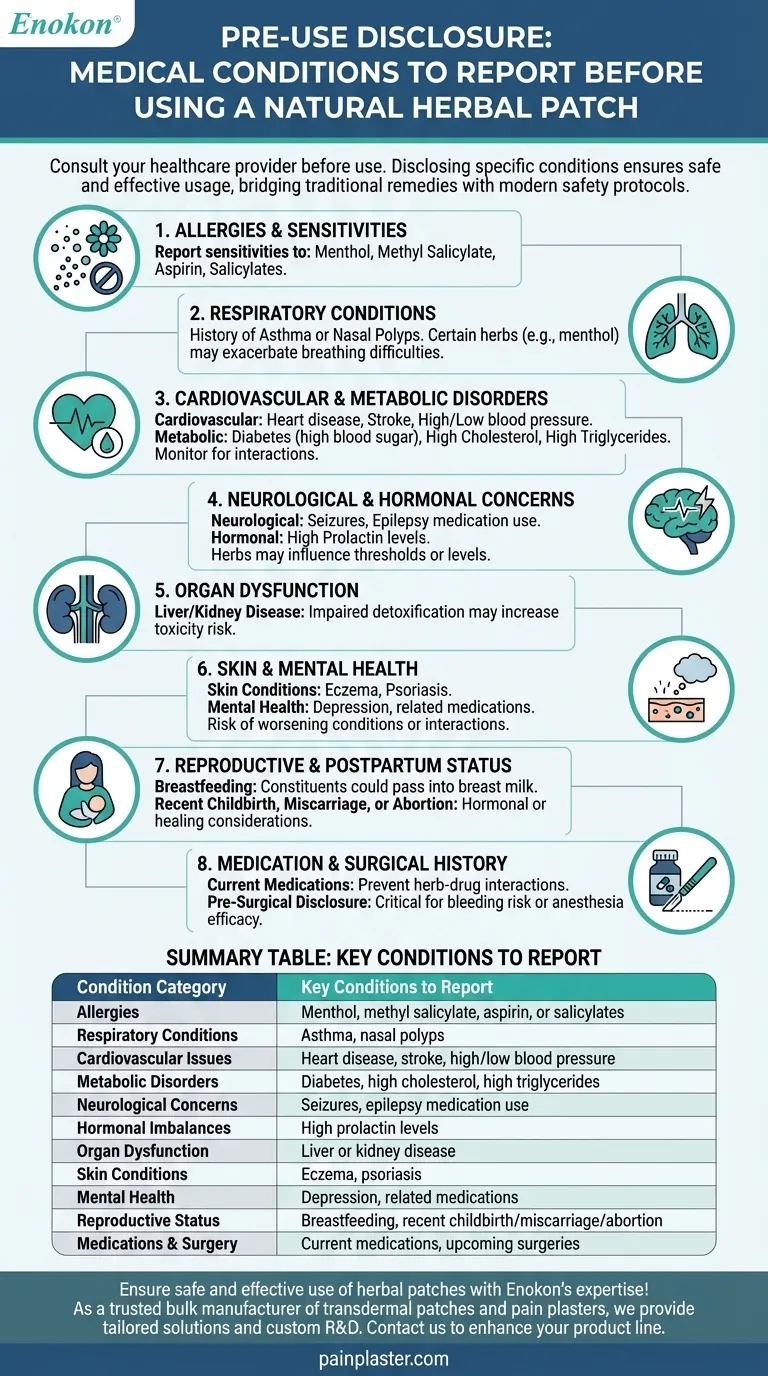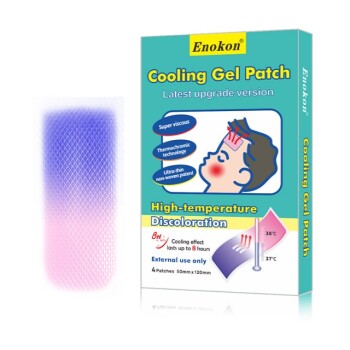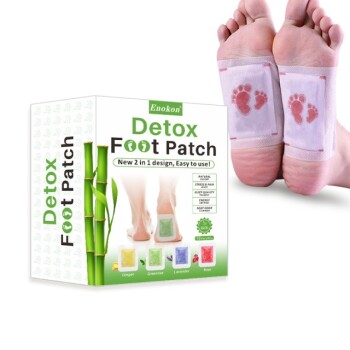Before using a natural herbal patch, it is crucial to disclose specific medical conditions and allergies to your healthcare provider to ensure safe usage. Key conditions to report include allergies to menthol, methyl salicylate, aspirin, or salicylates, as well as a history of asthma or nasal polyps. Additionally, disclose cardiovascular issues (e.g., heart problems, stroke, high/low blood pressure), metabolic disorders (diabetes, high cholesterol, high triglycerides), neurological conditions (seizures, epilepsy medication use), hormonal imbalances (high prolactin levels), or organ dysfunction (liver/kidney disease). Skin conditions (eczema, psoriasis), mental health diagnoses (depression), recent reproductive events (childbirth, miscarriage), and breastfeeding status should also be shared. Always provide a full list of current medications, especially before surgeries.

Key Points Explained:
-
Allergies
- Report sensitivities to menthol, methyl salicylate, aspirin, or salicylates to avoid allergic reactions. These compounds are common in herbal patches and may trigger skin irritation or systemic responses.
-
Respiratory Conditions
- A history of asthma or nasal polyps requires caution, as certain herbal ingredients (e.g., menthol) could exacerbate breathing difficulties or inflammation.
-
Cardiovascular and Metabolic Disorders
- Disclose heart disease, stroke, or blood pressure abnormalities, as some patches may affect circulation.
- Diabetes or high blood sugar (even familial history) and high cholesterol/triglycerides need monitoring, as herbal components might interact with glucose or lipid metabolism.
-
Neurological and Hormonal Concerns
- Seizures or epilepsy medication use: Some herbs may lower seizure thresholds or interact with anticonvulsants.
- High prolactin levels or hormonal imbalances could be influenced by herbal ingredients.
-
Organ Dysfunction
- Liver/kidney disease: Impaired detoxification or excretion may increase the risk of toxicity from patch ingredients.
-
Skin and Mental Health
- Eczema, psoriasis, or other skin conditions may worsen with adhesive or herbal irritants.
- Depression symptoms or related medications might interact with bioactive compounds in the patch.
-
Reproductive and Postpartum Status
- Breastfeeding: Herbal constituents could pass into breast milk.
- Recent childbirth, miscarriage, or abortion may necessitate hormonal or healing considerations.
-
Medication and Surgical History
- Always share current medications to prevent herb-drug interactions.
- Pre-surgical disclosure is critical, as some herbs increase bleeding risk or alter anesthesia efficacy.
By systematically addressing these factors, users can mitigate risks and tailor the use of natural herbal patches to their unique health profile. Have you considered how underlying conditions might silently interact with herbal therapies? Such disclosures bridge traditional remedies and modern safety protocols.
Summary Table:
| Condition Category | Key Conditions to Report |
|---|---|
| Allergies | Menthol, methyl salicylate, aspirin, or salicylates |
| Respiratory Conditions | Asthma, nasal polyps |
| Cardiovascular Issues | Heart disease, stroke, high/low blood pressure |
| Metabolic Disorders | Diabetes, high cholesterol, high triglycerides |
| Neurological Concerns | Seizures, epilepsy medication use |
| Hormonal Imbalances | High prolactin levels |
| Organ Dysfunction | Liver or kidney disease |
| Skin Conditions | Eczema, psoriasis |
| Mental Health | Depression, related medications |
| Reproductive Status | Breastfeeding, recent childbirth/miscarriage/abortion |
| Medications & Surgery | Current medications, upcoming surgeries |
Ensure safe and effective use of herbal patches with Enokon’s expertise! As a trusted bulk manufacturer of transdermal patches and pain plasters, we provide tailored solutions for healthcare distributors and brands. Our technical team supports custom R&D to meet your specific needs while ensuring compliance and safety. Contact us today to discuss how we can enhance your product line with reliable, high-quality patches.
Visual Guide

Related Products
- Herbal Eye Protection Patch Eye Patch
- Capsaicin Chili Medicated Pain Relief Patches
- Asthma Cough and Pain Relief Patch for Adults and Kids
- Heating Pain Relief Patches for Menstrual Cramps
- Mugwort Wormwood Pain Relief Patch for Neck Pain
People Also Ask
- Should under eye patches be applied before or after moisturizer? Optimize Your Skincare Routine
- How do eye patches enhance the effectiveness of eye creams? Boost Your Eye Care Routine
- What are the steps for applying under-eye patches? Boost Your Eye Care Routine
- How can using eye patches contribute to a self-care skincare routine? Boost Hydration & Relaxation
- How quickly can you see results from using under eye patches? Instant Brightening & Long-Term Benefits


















